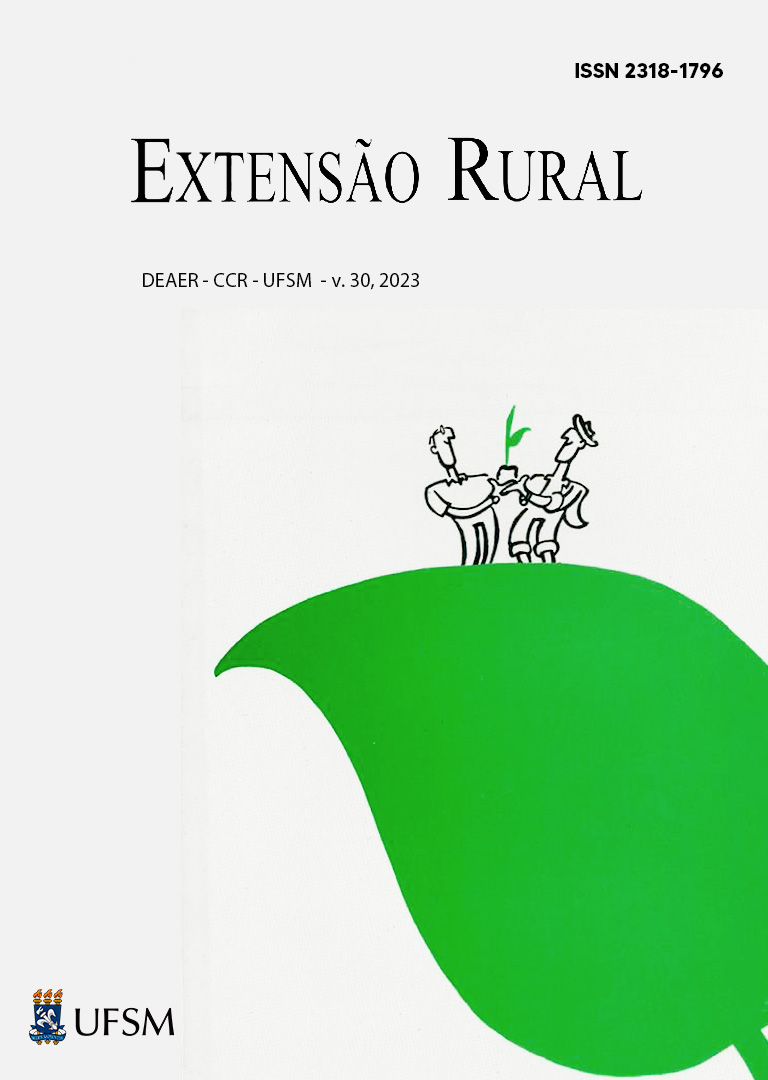Conditioning of production systems in rural settlements according to soil types
DOI:
https://doi.org/10.5902/2318179674626Keywords:
Soil mapping, Settlements, CropsAbstract
The objective of this work is to discuss the correlation between the types of soils and the production systems in rural settlements, having as a reference field the Núcleo de Assentamentos in the municipality of Sant'Ana do Livramento. It is highlighted in this work that the type of soil is not a criterion for the distribution of lots in agrarian reform settlements in Brazil and that areas under dystrophic soils can negatively interfere with the development of crops. Through the SIGRA 2016 database, productive information was obtained from the settlements that make up the Nucleo Operacional Sant'ana do Livramento, as well as the geographical coordinates of the settlements, to prepare the location maps and types of soils. The productive data and number of families of three selected settlements were updated in 2022. The distinction of soils in rural settlements, predicting their behavior and limitations is an important tool to define the agricultural potential of the areas. Regardless of the type of soil, the settlements presented diversity in the productive system, but negative aspects related to the type of soil, such as requirements for correctives and fertilizers, can be an inference for the decline in production. The types of soils can determine or limit the production systems, defining the areas of the settlements taking into account the soil can increase the productive potential of the settled families.
Downloads
References
AGUIAR, J.S.V. de. Uso da terra, técnica e territorialidade: os assentamentos de Sant’Ana do Livramento/RS. 2011. 255p. Dissertação (Mestrado) - Universidade Federal do Rio Grande do Sul, Porto Alegre/RS.
ARAÚJO, R.C. DE; ALMEIDA, T. DE; CICERELLI, R.E.; RODRIGUES, S.P. Reforma Agrária no Brasil: Classificação Baseado em Objeto e Reflectância Acumulada no Monitoramento e Fiscalização da Terra. Revista Brasileira de Cartografia, v.72, p.100-109, 2020.
AZEVEDO, J.R. DE; BUENO, C.R.P. Potencialidades e limitações agrícolas de solos em assentamento de reforma agrária no município de chapadinha-ma. Revista Scientia Agraria, v.17, p.1-13, 2017.
BARBOSA NETO, M. V.; ARAÚJO, M. do S. B. de; ARAÚJO FILHO, J. C. de. Zoneamento do potencial agrícola dos solos de uma área de cultivo na Zona da Mata de Pernambuco. Sociedade & Natureza, v. 29, p. 295-308, 2022.
BRANDOLT, R. de J. Releitura da classificação de köppen para demonstrar a variabilidade climática: proposta para formação de professores. Revista do Programa de Pós-graduação em Geografia, v.12, n.2, p.252-261, 2019.
FLECH E.M.; FRIEDERICH, G. Um sistema integrado de gestão rural (SIGRA) como instrumento de gestão da atuação em rede. In: DALBIANCO, V.P.; NEUMANN, P.S.; ZARNOTT, A.V.; FIALHO, M.A.V. Uma nova extensão rural pública: a experiência pluralista e descentralizada da Assessoria Técnica, Social e Ambiental (Ates) no Estado do Rio Grande do Sul. Unijuí, Ijuí, p.179-196, 2018.
FLECH, E.M.; NEUMANN, P.S. A produção das famílias assentadas pela reforma agrária no rs. In: DALBIANCO, V.P.; NEUMANN, P.S.; ZARNOTT, A.V.; FIALHO, M.A.V. Uma nova extensão rural pública: a experiência pluralista e descentralizada da Assessoria Técnica, Social e Ambiental (Ates) no Estado do Rio Grande do Sul. Unijuí, Ijuí, p.275-297, 2018.
GALVÃO, J. C. C.; MIRANDA, G. V.; TROGELLO, E.; FRITSCHE-NETO, R. Sete décadas de evolução do sistema produtivo da cultura do milho. Revista Ceres, v. 61, p. 819-828, 2014.
HOFF, R.; FALCADE, I.; BERGMANN, M.; ALBERTI, R.; MODENA, R. C. C.; DALCIN, M. Geologia, geomorfologia e paisagem vitícola: uma abordagem da identidade regional da viticultura na região vitivinícola campanha, Brasil. Revista Brasileira de Geomorfologia, v. 19, p. 757-776, 2018.
IBGE. Mapa Exploratório de Solos do Estado do Rio Grande do Sul. 2002. Disponível em: <https://geoftp.ibge.gov.br/informacoes_ambientais/pedologia/mapas/unidades_da_federacao/rs_pedologia.pdf> Acesso em: 20 de junho de 2022.
IBGE. Tabela de atributos pedológicos. 2021. Disponível em: <https://www.ibge.gov.br/geociencias/downloads-geociencias.html> Acesso em: 22 de junho de 2022.
LUNARDI NETO, A.; ALMEIDA, J. A. de. Caracterização morfológica e química de Argissolos com horizontes subsuperficiais escurecidos em Santa Catarina. Revista de Ciências Agroveterinárias, v. 12, n. 3, p. 294-303, 2014.
ROCHA, N. S. DA; ZANELLA, F. C.; ROCHA, J. M. DA; CRUZ, R. C. Assentamentos rurais na metade sul do Rio Grande do Sul e a sua compatibilidade com o bioma pampa: estudo no assentamento São Joaquim. Retratos de Assentamentos, v. 20, p. 164-185, 2017.
SANS, L. M. A.; SANTANA, D. P. Cultivo do milho: clima e solo. Sete Lagoas, MG: Embrapa Milho e Sorgo, 2002. 4p. (Embrapa Milho e Sorgo. Comunicado Técnico, 38).
SANTOS, H. G. dos; FIDALGO, E. C. C.; COELHO, M.R.; ÁGLIO, M. L. D.; SANTOS, A. B. dos. Os solos e a cultura do arroz. In: CONGRESSO BRASILEIRO DE CIÊNCIA DO SOLO, 32., 2009. Fortaleza. Anais: O solo e a produção de bioenergia: perspectivas e desafios. Fortaleza: SBCS, 2009.
SANTOS, H.G. DOS; JACOMINE, P.K.T.; ANJOS, L.H.C. DOS; OLIVEIRA, V.A. de; LUMBRERAS, J.F.; COELHO, M.R.; ALMEIDA, J.A. de; ARAÚJO FILHO, J.C. DE; OLIVEIRA, J.B.; CUNHA, T.J.F. de. Sistema brasileiro de classificação de solos. 5.ed. rev. e ampl. Brasília D.F.: Embrapa, 2018. 356p.
SILVA, E. B. da; NOGUEIRA, R. E.; UBERTI, A. A. A. Avaliação da aptidão agrícola das terras como subsídio ao assentamento de famílias rurais, utilizando sistemas de informações geográficas. Revista Brasileira de Ciência do Solo, v. 34, p. 1977-1990, 2010.
TRINDADE, J.P.P.; ROCHA, D.S. da; VOLK, L.B. da S. Uso da terra no Rio Grande do Sul Ano de 2017. 1.ed. Bagé: Embrapa Pecuária Sul, 2018. 18p.
VERDUM, R.; BASSO, L. A.; SUERTEGARAY, D. M. A. Rio Grande do Sul: paisagens e territórios em transformação. 2.ed. Porto Alegre: UFRGS, 2012. 360p.








